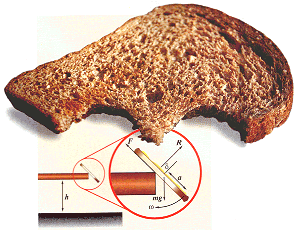Butter-Side-Down Syndrome

Why does toast almost always fall butter side down? The experts say it boils down to the fact that when toast falls gravity makes it start to spin, and this natural consequence of gravity acting on the typical height of the average breakfast table causes the toast to land butter-side-down. As an alternative you could eat breakfast atop a ladder so that the toast has time to turn right-side-up again.
Of course how it happens doesn’t matter to us nearly as much as the simple fact that it does happen. Since eating breakfast is one of the first things we do to start our day, when our toast falls (usually butter-side-down) its often our human nature to attribute it to the start of a bad day. In truth though, we should count ourselves lucky that our toast even had a chance to fall when you consider that as many as 600 Americans every year are said to be killed falling out of bed. The fact is “stuff happens”, that’s not in our control. But its not what happens to you that’s important, its how you react.
Optimism is an outlook on life such that one maintains a view of the world as a positive place, or one’s personal situation as a positive one. Optimists believe that regardless of the external world or situation, one should choose to feel good about it and make the most of it. Having a “glass half full” attitude and thinking optimistically from an early age in life predicts health and well being in later years. Optimism has demonstrable benefits, and pessimism has drawbacks. This according to Christopher Petersen, PhD & author of A Primer in Positive Psychology. He goes on to say that optimism has been linked to positive mood and good morale as well as success, popularity and good health. Even if you have been a pessimist for many years, its not too late to change your way of thinking and reap the benefits of a positive attitude.
Indeed one source of positive or negative outlook may well be inborn temperament – that is that, by nature, some people tend one way or the other. But temperament can be tempered by experience. Optimism and hope, like helplessness and despair, can be learned. Self-efficacy is what psychologists refer to as the belief that one has mastery over the events of one’s life and can meet challenges as they occur. A researcher on self-efficacy, Stanford psychologist Albert Bandura, states: “People’s beliefs about their abilities have a profound effect on those abilities. Ability is not a fixed property, there is a huge variability on how you perform. People who have a sense of self-efficacy bounce back from failures; they approach things in terms of how to handle them rather than worrying about what can go wrong.”
So as the saying goes, some days we’re the windshield and some days we’re the bug and on those days toast will inevitably fall, airlines will “misplace” our luggage and car engines will break down when we most need them to work. But a positive attitude helps us cope more easily with our daily struggles, and effects critical aspects of our life such as success, popularity and health.
Please subscribe to the Ordinary Miracles blog by email or RSS.
